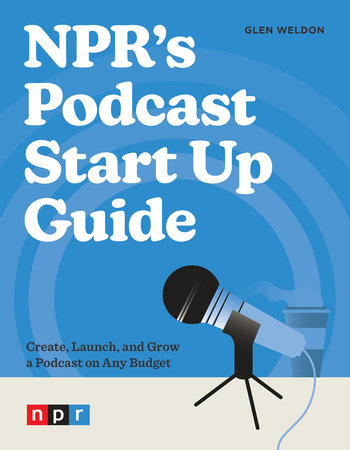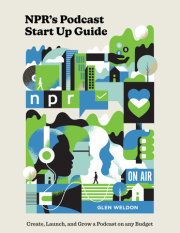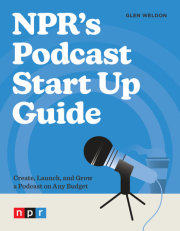Podcasting with a PlanWhoever you are, whatever you love, there’s a podcast for you. More every day. Sports fan, knitting obsessive, culture vulture, armchair psychologist, political junkie, science nerd, foodie, left-handed Bolivian dental hygienist—you name it, there’s a podcast about it.
Podcasting’s growth has been nuts, and it’s continuing. In 2019, the
New York Times counted more than seven hundred thousand podcasts in existence, with two to three thousand new shows appearing every dang
month. That same year, podcasting reached a major milestone when an Infinite Dial Study by Edison Research and Triton Digital found that more than 50 percent of Americans ages twelve and over said they had ever listened to a podcast.
Podcasts are booming because they speak to our collective obsession with wanting to know stuff (the faster the better; we’re busy!) and to enjoy stuff (being busy can be stressful; we need downtime!). Podcasts make these leaps in knowledge and pleasure available in the time it takes to tuck in earbuds—while freeing our eyeballs and hands to do other things. We listen while we commute, work out, walk the dog, cook, or drift to sleep.
But there’s another growth curve. Hundreds of thousands of us are transforming our love of listening to podcasts into creating them.
Maybe you picked up this book because you’ve got an idea or a message that’s important to you. Maybe friends or family have said, “You should do a podcast!” Maybe you want to explore audio storytelling. Or maybe you heard that podcasts can help your business.
Most of us who love podcasts haven’t thought too much about what goes into making them. They’re just there for us. We wake up, open our phone, and our favorite podcasts are downloaded and waiting. But a
lot of steps happen between the seed of an idea and that polished, finished product.
With so many people getting into podcasting, quality varies hugely. Too hugely. Sure, the barrier to entry in podcasting is low—like,
very low. So low it’s making a divot in the carpet: If you’ve got a mic and a laptop, you can create a successful podcast, right?
Wrong. Execution matters. Poor sound quality, sloppy or non-existent editing, undercooked storytelling, and a host of other issues render many—okay, most—podcasts unsustainable and unlistenable.
The barrier to entry may be low, but the learning curve is steep.
Sit down with any podcaster and you’ll hear stories from the trenches, from forgetting to hit the Record button to learning—with slow-dawning horror—that the one interview subject they’ve built an episode around dried up somewhere between the juicy preinterview and the guarded, dull-as-dishwater recording session. While any project worth undertaking has challenges, many of the most common stumbling blocks, blind alleys, rabbit holes, and curve balls are avoidable, if you know the questions to ask yourself first.
That’s what this book’s about. Setting your sights on quality is crucial in a crowded marketplace where audiences will move on if they aren’t instantly hooked by a story. And every podcast out there is jostling for attention—for listeners clicking, downloading, and sharing—in the merciless algorithmic mosh pit called the internet.
Consider this: Typically, 20 to 35 percent of a podcast episode’s audience drops out in the first five minutes. Getting and keeping audience attention is serious business. You have to give this podcasting thing your best shot to avoid the dreaded, all-too-common petering-out phenomenon that some have labeled “podfade.”
I’m here to help. I want to share what we at NPR know about keeping people listening.
This book is the definitive, go-to guide on how to podcast, powered by NPR’s decades of experience, expertise, and acclaim in the audio space. I’ll share proven strategies, from nurturing the glimmerings of an idea to getting your audience to hit Play. You’ll learn how to figure out the best structure and format for your podcast; storytelling techniques that hook listeners; important fundamentals on scheduling, budgeting, and legalities; the dos and don’ts for recording and editing; and the nuts and bolts for the launch and distribution of the final product.
Some of this book’s information has been adapted from materials developed by the NPR Training team—which includes our wide-ranging catalog of tips and tricks for audio journalism and storytelling. But you’ll get much more than that. How do the pros open a story in a compelling way that makes listeners stick around? What advice do they have for aspiring podcasters? You’ll find insights from some of the most respected names in the NPR and podcasting universe, plus wisdom from our producers, writers, editors, sound technicians, and project managers, who know what it takes to get a podcast done and
done. To be clear: The goal isn’t for you to sound like NPR. It’s to outfit you with the questions to ask yourself—based on the hard-won lessons we’ve learned over the years—that will make you sound like
you. Because that, at the end of the (very long!) day, is what your podcast must and should be:
your voice,
your passion.
Your story.
Copyright © 2021 by Glen Weldon. All rights reserved. No part of this excerpt may be reproduced or reprinted without permission in writing from the publisher.







